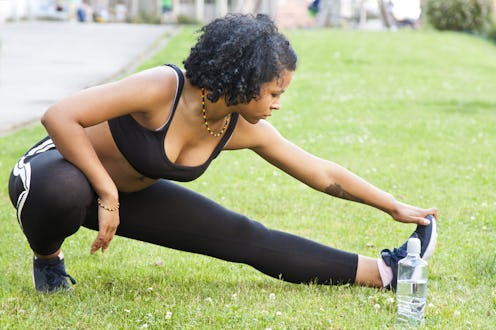Life
The One Post-Workout Stretching Mistake That’s Super Easy To Make

Getting a good stretch going before and after your workouts is important for avoiding injury and improving flexibility. But it can be easy to overdo it and exceed your physical limits, especially if you have a tendency to push yourself while you're exercising. It's surprisingly easy to from a properly stretched muscle, which sets you up for a good workout and recovery, to an overstretched muscle, and it can lead to muscle strain and injuries.
As important as stretching is to your fitness routine, overstretching happens when you stretch your muscles beyond their capacity in terms of flexibility and range of motion. According to audio fitness brand Aaptiv, *overloading* your muscles can lead to strains and injuries, and it’s important to pay attention to the signs of overexertion.
"Flexibility is defined by the ability to passively achieve a range of motion. Mobility is defined as the ability to move with control. Understanding how these two concepts are different impacts the way you stretch," Aaptiv trainer Nicole Sciacca tells Bustle via email. "The body reacts to the stimulus you give it."
Feeling a slight pull in the muscle in a way that’s not totally comfortable is a positive thing — it means that you’re working to increase flexibility. A productive stretch should feel a little bit uncomfortable, but if you feel a stabbing or sharp sensation, or actual pain, that’s a no-go.
"Overstretching is not necessarily a frequent problem but it can happen," says Sciacca. "Often times when a muscle feels tight, the central nervous system is 'protecting' us from going too far in a certain direction because it doesn’t trust us in that position." By staying mentally present when stretching, and not exceeding your natural end range of motion (the place where your body instinctively stops you), you can avoid the dreaded overstretch, Sciacca notes.
Sciacca says that everyone's individual flexibility depends on your collagen make-up, past injuries, and overall bodily awareness. "The important thing to remember is that moderate stretching is better than nothing — but overdoing it will do more damage than good," she says.
Well + Good reports that there’s a “fine line” between challenging your muscles in order to increase your fitness or flexibility levels , and hurting yourself. Not warming up enough before your workout is the primary reason that you might strain or pull a muscle. If you exercise in hot weather, or take heated yoga classes, this is something to pay particular attention to, Heather Peterson, the chief yoga officer at CorePower Yoga told Well + Good: “High temps get you sweating before your muscles are fully warmed up,” so you might end up overstretching without realizing it. LIVESTRONG notes that if you do feel pain, or end up with a pulled or strained muscle, stop exercising right away. If the pain persists, or your movement is impaired, go see your doctor when you can.
While a strained muscle is the stretching or tearing of a muscle or a tendon, a sprain means that you’ve torn or stretched a ligament, according to the Mayo Clinic. Sprains happen most often in your ankle, while strains are most common in the lower back or hamstring. Treatment for sprains and strains includes ice, rest, compression with tape or bandages, and elevation, the Mayo Clinic states, and most injuries can be treated at home. If you wind up with a severe strain or sprain, however, you might need surgery to help further your recovery.
One of the best ways to avoid overstretching is to listen to your body, Sciacca suggests. Mindfulness, and staying present with both the movements that you’re doing, and how they feel, will help you know when your body has reached a limit of what it can do. If you feel any pain, or if something feels off at any point during your workout, back off. It’s far better to build strength and flexibility over time than risk an injury to your muscles that will have you hurting.